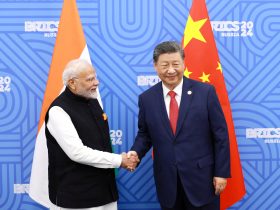
An August 2021 picture of supporters of Donald Trump lining as much as attend a “Save America” rally at York Household Farms in Alabama. (AFP)
The 2024 US presidential election is extra than simply a couple of Republican resurgence. It signifies a possible realignment throughout the American political panorama—a “crimson deluge” that will point out a foundational shift in voter behaviour and ideological preferences. With 48 out of fifty states transferring rightward, together with historically Democratic strongholds like California, New York, and Illinois, the information suggests a deep, presumably systemic shift. Such widespread beneficial properties throughout the ideological spectrum reveal not merely a reactionary vote in opposition to particular Democratic insurance policies however maybe an evolving sentiment that crosses typical partisan boundaries. This sample might replicate shifts in public attitudes towards governance, coverage priorities, or cultural points, signalling a reconfiguration of conventional political affiliations.
In New York, Republicans received considerably by flipping a state Senate seat in Brooklyn, a borough lengthy thought of a Democratic bastion. Retired NYPD Sergeant Steven Chan defeated incumbent Democrat Iwen Chu within the seventeenth District, marking a historic win for the GOP on this space.
A Narrative Warfare
Equally, in California, historically a Democratic stronghold, Republicans have made notable inroads. The GOP’s give attention to financial points and public security has resonated with voters involved in regards to the state’s dealing with of those issues. This shift is clear within the elevated assist for Republican candidates in varied native elections, indicating a broader pattern of adjusting political allegiances.
In battleground states like Pennsylvania, Michigan, and Wisconsin, the place political loyalties have traditionally been fluid, the Republican benefit was much more pronounced. The consistency of those beneficial properties throughout varied states and areas implies greater than a transient desire swing; it suggests a extra profound ideological realignment that would reshape the steadiness of energy. Theoretical fashions of political realignment would interpret this as a shift within the “political centre”, the place structural adjustments—financial, demographic, or cultural—redefine voter bases and problem established get together dynamics.
There are a number of causes for the large Trump victory, however this column is in regards to the “us versus them” narrative, which was answerable for the Democrats’ debacle. The Democrats’ dedication to a “with us or in opposition to us” mentality—born out of opposition to Trump in 2017—created a robust, polarising lens that formed their method to governance, particularly in the course of the COVID-19 disaster. What began as a rallying cry to withstand authoritarianism advanced right into a mindset that equated disagreement with anti-democratic extremism. This was extra than simply political posturing. As a substitute, it grew to become an institutional stance that influenced how insurance policies have been designed and justified, usually sidelining extra nuanced discussions.
Us vs Them, Good vs Dangerous
Throughout COVID, this “all-or-nothing” framing led to a number of the most inflexible and divisive well being insurance policies. Lockdowns and mandates have been usually introduced as ethical imperatives, the place compliance wasn’t nearly following well being pointers however about being on the “proper facet” of democracy. Questioning these insurance policies—whether or not on scientific, private, or sensible grounds—was thought of harmful and nearly traitorous. This mindset stifled wholesome debate and sidelined respectable considerations, making insurance policies tougher for folks to belief and comply with.
Psychology tells us that black-and-white pondering strengthens group loyalty however usually deepens divisions. By framing pandemic responses as a take a look at of democratic allegiance, Democrats created an “in-group” of loyalists and an “out-group” of dissenters, making it tougher for insurance policies to be adopted primarily based on suggestions or new info. This phenomenon is named “groupthink”, the place the strain to evolve discourages questioning, even when insurance policies may benefit from it.
The way in which COVID-19 insurance policies grew to become a litmus take a look at for political loyalty additionally speaks to an idea known as “biopower”, the place establishments use management over well being to implement broader values. Public well being wasn’t nearly well being; it was about loyalty to a selected political outlook, with individuals who disagreed feeling sidelined. This sort of inflexible, ideological enforcement strains public belief and sometimes backfires, as we noticed with the backlash in opposition to sure insurance policies.
Ultimately, by framing so many points by a “democracy versus authoritarianism” lens, Democrats made it tougher to craft insurance policies that felt inclusive and versatile. What was meant as a defence of democracy ended up placing it in danger, because it lowered complicated points to easy binaries, alienating folks and undermining the very belief wanted to make these insurance policies efficient.
A Backlash Towards Moralising
Trump’s enchantment might be analysed by the theoretical lens of anti-institutionalism and political alienation, notably throughout the framework of populism. Trump’s success represents a type of populist backlash in opposition to what his supporters understand as a sanctimonious institutional order that enforces restrictive norms round speech and behavior, usually known as “political correctness”.
Sociologists and political theorists like Pierre Bourdieu argue that dominant establishments, by their “symbolic energy”, implement behavioural and linguistic norms, subtly controlling the boundaries of acceptable discourse. This enforcement usually creates a way of alienation for these constrained by these unwritten guidelines, notably in areas the place consciousness of microaggressions or social sensitivities is heightened.
Moreover, cultural backlash idea explains Trump’s enchantment as a response from those that really feel left behind by speedy social and cultural shifts. In ‘progressive’ or “blue” states, the place vigilance in opposition to microaggressions is excessive, people might really feel stifled by the perceived calls for of political correctness. Trump’s open rejection of those norms allowed him to faucet right into a reservoir of resentment amongst people who seen such requirements as a menace to their freedom of expression. They noticed Trump’s candid fashion as a liberation from the “oppressive” norms imposed by establishments they imagine have turn into too centered on social sensitivities.
The Limits Of Symbolic Politics
Moreover, this assist displays parts of symbolic politics, the place Trump grew to become a logo of riot in opposition to the elite-dominated cultural institution. Trump’s directness and willingness to interrupt norms resonated with voters who felt dismissed or condescended to by conventional elites. On this context, Trump’s willingness to “go too far” was seen not as a flaw however as a badge of authenticity, embodying the frustration many felt a couple of system they noticed as imposing unyielding requirements prioritising sensitivity over free speech.
The American financial system might seem resilient on paper, however this supposed stability is a mirage for most individuals. Each go to to the grocery retailer, each utility invoice, and each tank of fuel serves as a painful reminder that costs at the moment are properly past what they have been in 2019. The federal government’s rosy narrative about financial energy turns into meaningless in opposition to on a regular basis struggles—a actuality the place inflation quietly however relentlessly erodes buying energy and undermines any sense of monetary safety. Claims of financial robustness fall flat when the general public feels the sting of rising prices day by day.
Tradition Wars
The relentless cultural crusades pushed by these in energy have reached an insupportable peak, exposing a authorities completely divorced from the struggles and priorities of the general public. Political scientists argue that this fixation on tradition wars stems from a need to consolidate ideological bases and enchantment to identity-driven voter segments, in the end reshaping governance priorities round divisive points slightly than unifying objectives. This focus might be understood by frameworks like “agenda-setting idea”, the place political leaders intentionally use cultural flashpoints to dominate public discourse, usually on the expense of substantive coverage areas like financial stability, healthcare, or infrastructure. Such methods exploit societal cleavages, remodeling them into political instruments that provide little greater than rhetorical beneficial properties.
Moreover, the relentless engagement in tradition wars might sign an evolution, like political detachment. By perpetually immersing themselves in symbolic conflicts, leaders successfully obscure the disconnect between their priorities and the pure, measurable considerations of the populace, contributing to a type of governance described as “efficiency politics”. This performance-based method erodes institutional legitimacy, leaving residents sceptical of whether or not the federal government intends to deal with real societal challenges or merely preserve a facade of ideological purity.
Thus, in a panorama the place political loyalty grew to become a take a look at of ethical standing, Trump’s unfiltered, anti-institutional rhetoric provided another, channelling the frustration of those that felt marginalised by an more and more performative political tradition.
(Aditya Sinha is Officer on Particular Obligation, Analysis, Financial Advisory Council to the Prime Minister. Views are private.)
Disclaimer: These are the non-public opinions of the writer







